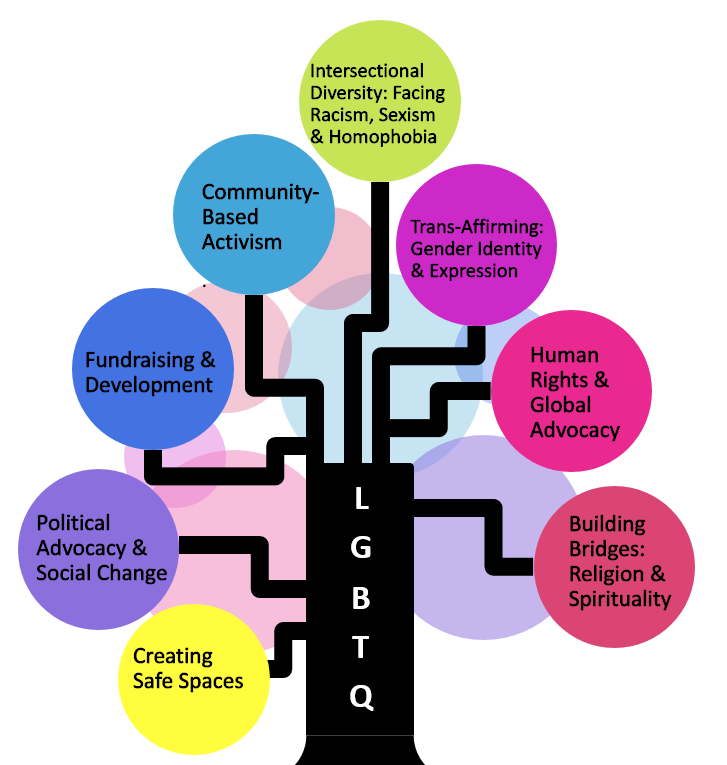Please do not hesitate to reach out to us at SOE_Certificates@redlands.edu with any questions.
The University of Redlands' Undergraduate Certificate in LGBTQ Leadership's online coursework and internship experience equips students with an in-depth understanding of the key issues that face the LGBTQ community and reveals the benefits of an intersectional approach to leadership.
As the LGBTQ movement continues to expand across the country with advocacy and social-service organizations in schools, colleges, and community centers, the need and demand for specialized LGBTQ Leadership training has risen. This LGBTQ Leadership Certificate is designed to address this need, providing training for mission-driven individuals, aspiring leaders, teachers, and activists to be more informed and experienced allies for the LGBTQ community.
Certificate Learning Outcomes
The Certificate program increases awareness of what is essential for providing effective LGBTQ leadership. Through the curriculum, LGBTQ Certificate students will:
- Discover the key challenges and benefits of an intersectional approach to leadership
- Discuss what it means to create safe spaces in particular contexts
- Learn about the shifts in understanding and respecting gender variance
- Hear affirming faith leaders explore the place of religion and spirituality in equality work
- Analyze social change work through community-based activism
- Acquire an understanding of the global landscape for LGBTQ human rights
- Secure insights into fundraising and nonprofit development
Additionally, tuition from the Certificate program directly supports the Trans Heartline House Initiative at the University of Redlands Marin Campus.
LGBTQ Leadership Certificate and Curriculum Structure
The Certificate in LGBTQ Leadership is an accelerated program that can be completed in six months and includes six online seminar courses and an in-person internship, costing $400 each, and schloarships are available. The online structure of the Certificate seminars is ideal for working professionals, fitting seamlessly within busy schedules. The courses are delivered synchronously, fostering engagement and connection with the seminar leaders. Each seminar is taught by two or three thought leaders, ensuring students have access to in-demand knowledge of LGBTQ Leadership concepts.
Students seeking the Certificate in LGBTQ Leadership need to complete all three required courses and then select three additional elective courses; options outlined below. Seminars are four weeks long and run as asynchrous weekly sessions. Students can engage with the course materials on their own time.
In addition to the six courses, students also participate in an internship with a partner organization or one approved by the course coordinator; these internships extend for four to six weeks, totaling 30 hours of in-person learning. Learn more about the curriculum, including the internship requirement by reviewing individual course details.
Required Certificate Courses
- LEADWI-400 Intersectional Diversity: Facing Racism, Sexism, and Heterosexism
- LEADWI-401 Trans-Affirming: Gender Identity and Expression
- LEADWI-402 Creating Safe Spaces
Elective Certificate Courses - Select Three
- Community-Based Activism Political Advocacy and Social Change
- Fundraising and Development
- Structures of Acceptance: Family, Community
- Building Bridges: Religion and Spirituality
In-Demand Skill Development
The certificate program aims to train and increase the number of LGBTQ community leaders through leading theory, hands-on learning, and collaboration with peers, instructors, and LGBTQ organizations. Students are encouraged to engage with members of their cohort to work on a community project that puts seminar knowledge into action, expanding their professional skill set.
Become a Skilled, Compassionate Community Leader
The online Certificate in LGBTQ Leadership empowers students to apply specialized training in effective methodologies for leadership in their communities in order to make an impact that changes the world.
Learn More About the School of Education
For any questions or additional information, contact Undergraduate Admissions or Graduate Enrollment.

